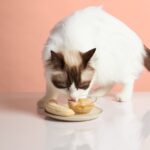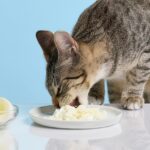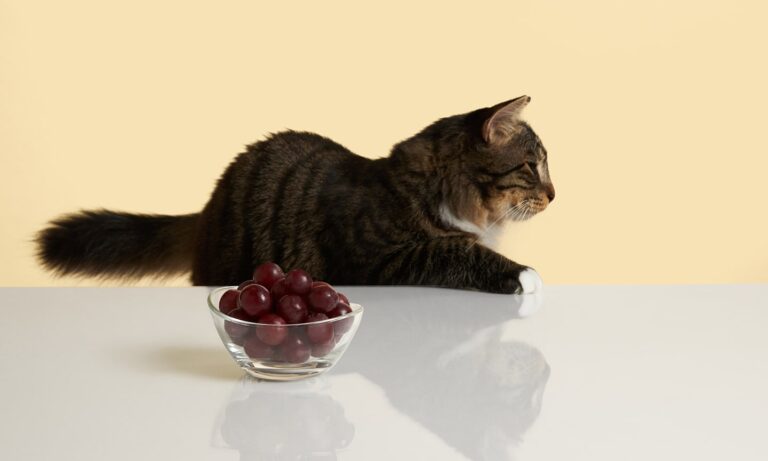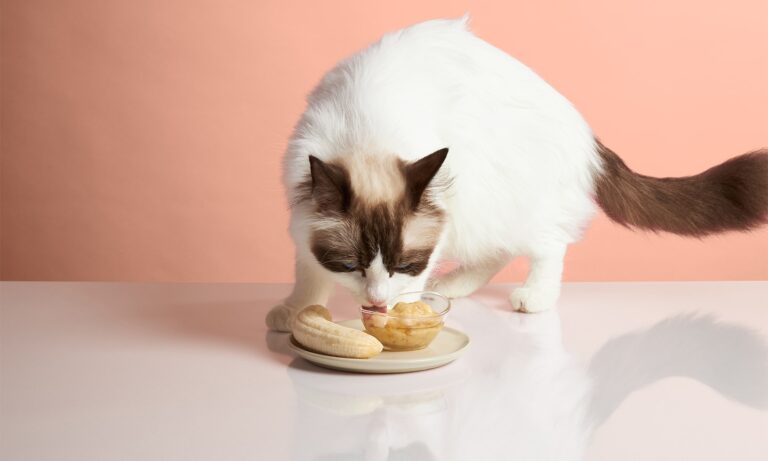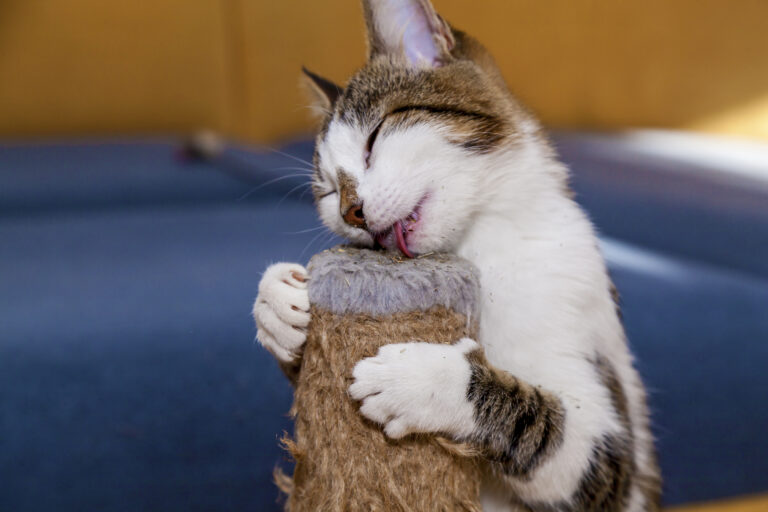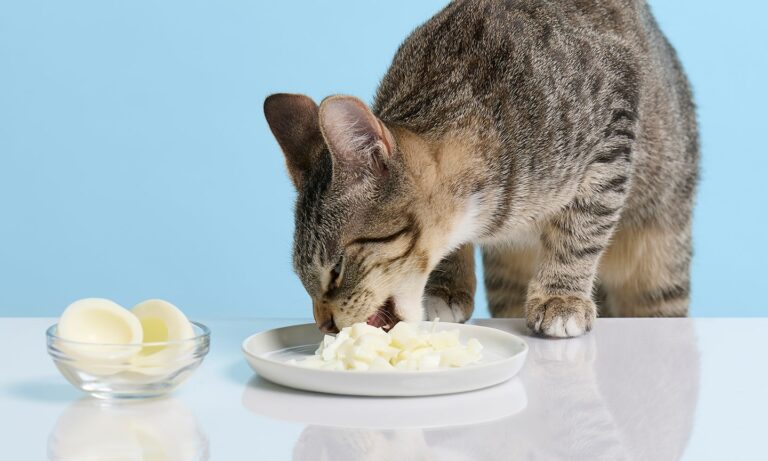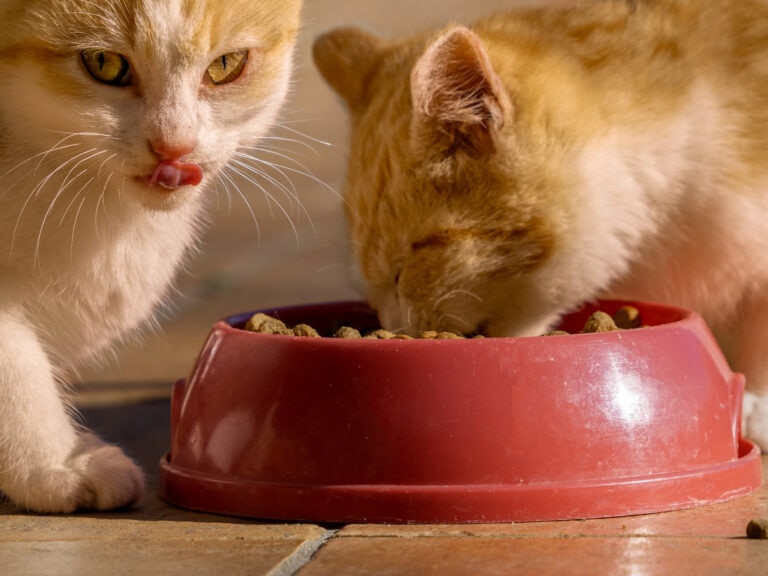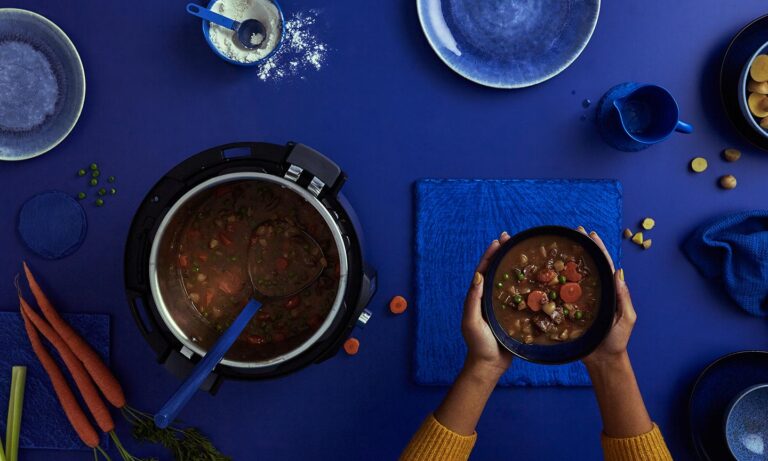Can Cats Eat Peanut Butter?
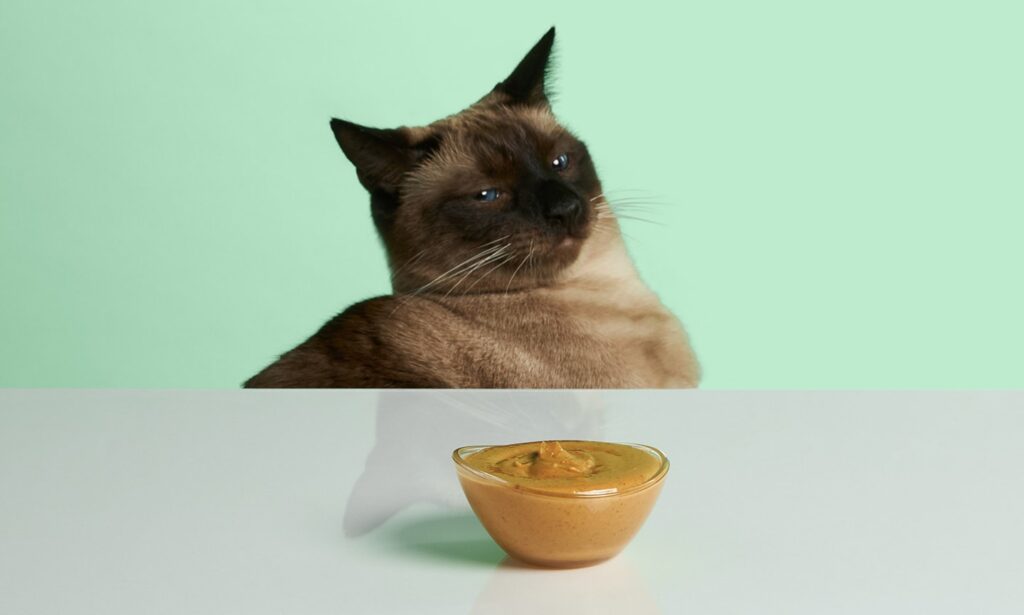
Photo by Chewy Studios
Ah, peanut butter: Dogs love it. But can cats have peanut butter, too? In short, no.
Peanut butter might be a beloved treat for pet parents and dogs alike, but when it comes to cats, this delightful human food shouldn’t be added to your furry feline friend’s treat repertoire. Why? For starters, while technically cats can have peanut butter on occasion, including as a way to get them to take their dang medication, vets say paws down to making peanut butter a regular part of your cat’s diet.
We’ll explain.
Why is Peanut Butter Bad for Cats?
For one thing, there’s no nutritional value.
“It has lots of empty calories,” says Dr. Sarah J. Wooten, DVM, a veterinarian at Sheep Draw Veterinary Hospital in Greeley, Colorado.
Cats are obligate carnivores (meat eaters who think of rodents al fresco as fine dining), and peanut butter is “just not part of their natural diet,” Dr. Wooten says. “Plus, I don’t like it for fat cats or for those who are sick in any way. It can just add to their problems.”
In the end, cats with any health issues should avoid peanut butter, Dr. Wooten says. “Those with diabetes, kidney problems, or with any kind of chronic gastrointestinal trouble, such as inflammatory bowel disease, need to stay far, far away.” These fur babies can get diarrhea, upset stomach or gas, she says.
The risks of feeding cats peanut butter include the following:
- It can cause gut issues: “[Peanut butter is] often high in fat and sugar,” says Dr. Wooten, “and these ingredients can cause issues with their gut, which is not designed to handle foods, like peanuts.” Many brands are also high in salt, “another ingredient that can mess with their digestive system,” Dr. Wooten says, adding that too much sodium can “exacerbate heart or kidney issues.”
- It can lead to weight gain: Peanut butter can have added sugars, making it high in calories. And due to the food’s caloric density, weight gain is a risk, especially for indoor pets or overweight cats.
- It’s a choking hazard: Due to its thick, sometimes chunky consistency, peanut butter is a choking hazard for felines. Ever eat a spoonful of peanut butter and have it stick to your teeth? Your cat’s throat and mouth are small, so even a tiny amount can get stuck.
- It can contain additives, like xylitol: Sugar-free peanut butter varieties often contain additives such as xylitol, a sugar substitute. Although it’s up for debate if cats develop hypoglycemia or liver failure (like dogs do) from eating xylitol, it’s better to be safe than sorry and keep them away from products containing xylitol, according to Dr. Wooten and Dr. Deborah Bayazit, DVM, co-owner and medical director of Brilliant Veterinary Care in New York City.
When Can Cats Eat Peanut Butter?
While the answer to “can cats have peanut butter?” is technically “yes,” Dr. Bayazit advises caution. If you do let them snack on it, she recommends limiting it to times when you need to give pills and keeping servings to an infrequent smidge.
Here’s the rundown on when and how to dole out peanut butter to cats:
- Read the nutrition label: Before letting kitty munch on the stuff, check the nutrition label. You’ll want to look at calorie count as well as whether or not it has an added ingredient, like xylitol. Your vet can help determine how many calories a day are ideal for your fabulous feline.
- Evaluate: Since total treats should not be more than 10 percent of your cat’s daily calorie intake, that’s just a smidge of the spread. “Keep in mind that one tablespoon of peanut butter has 100 calories. If your cat takes in some 250 calories a day, that means even a teaspoon (about 30 calories) is more than their total treat allowance,” Dr. Wooten says. “For pet parents who use it daily, in order to hide a pill, I’d recommend a 1/8 to 1/4 teaspoon max.”
- Camouflage: Peanut butter can be used as a way to hide medicine, as long as your kitty likes it, and you don’t see negative side effects. Although wet cat food is better, “if there’s no other way to get a pill into them, peanut butter can work,” says Dr Wooten. As she points out, “they could eat it every day, just like we could eat candy every day, but the advice from me is, not at all, unless you absolutely need to hide a med.”
- Monitor: All critters are different and whether or not cats tolerate it will vary. Your kitty may have no issue whatsoever, or it may turn out peanut butter doesn’t suit them. Watch for behaviors such as vomiting, diarrhea and other signs that it’s not sitting well with your cat.
Bottom line, if you’re trying to figure out if your cat can have peanut butter, consult with your veterinarian before serving it. The vet can determine the right portion for your pet, and weigh in on health issues that might preclude them having it.
FAQs About Cats and Peanut Butter
What happens if my cat licks peanut butter?
Most likely nothing, says Dr. Bayazit. “Though it can be pretty benign, and there are cats who tolerate it well, watch for signs of digestive distress like stomach upset, or abdominal pain.”
How much peanut butter can a cat have? How often can cats eat peanut butter?
“Just a smidgen,” advises Dr. Bayazit. Dr. Wooten suggests 1/4 teaspoon “or, better yet, 1/8.” And both vets assert that it’s best to only give this treat in order to hide medicines. There aren’t really health benefits, so if used daily to conceal a pill or two, keep it to the smallest possible amount.
Are peanuts poisonous to cats?
Like its cousin from a nutter mother, peanuts aren’t toxic to cats, but as to when cats can eat peanuts, proceed prudently. Keep amounts small, say ¼ of the nut, and only give unsalted, raw, and unshelled peanuts. The shells can be a choking hazard, and a cat’s sensitive tummy may have trouble with salt or other spices. If you decide to try them, watch for gastrointestinal issues, an indicator this human food plum disagrees with your cat. And always check with your vet before offering any new food.
What are the side effects of a cat eating peanut butter?
Often nothing. There might be zero side effects, or you could see an upset stomach, depending on your cat’s tummy sensitivity. “They can have symptoms, like loose stools, gas, or vomiting,” says Dr. Wooten. “Weight gain is something to watch out for, too.”
And last, but not least, it’s worth keeping in mind the lyrics to an old song about peanut butter: “Well, there’s a food goin’ round that’s a sticky, sticky goo. … Oh, well it tastes so good, but it’s so hard to chew. Peanut, peanut butter.” Yep, sorry feisty felines, choking can be a hazard of trying this tasty tidbit.
If you’re wondering about peanut butter for cats, check with your veterinarian first. Even occasional treats should be factored into your pet’s optimum daily nutritional needs.

